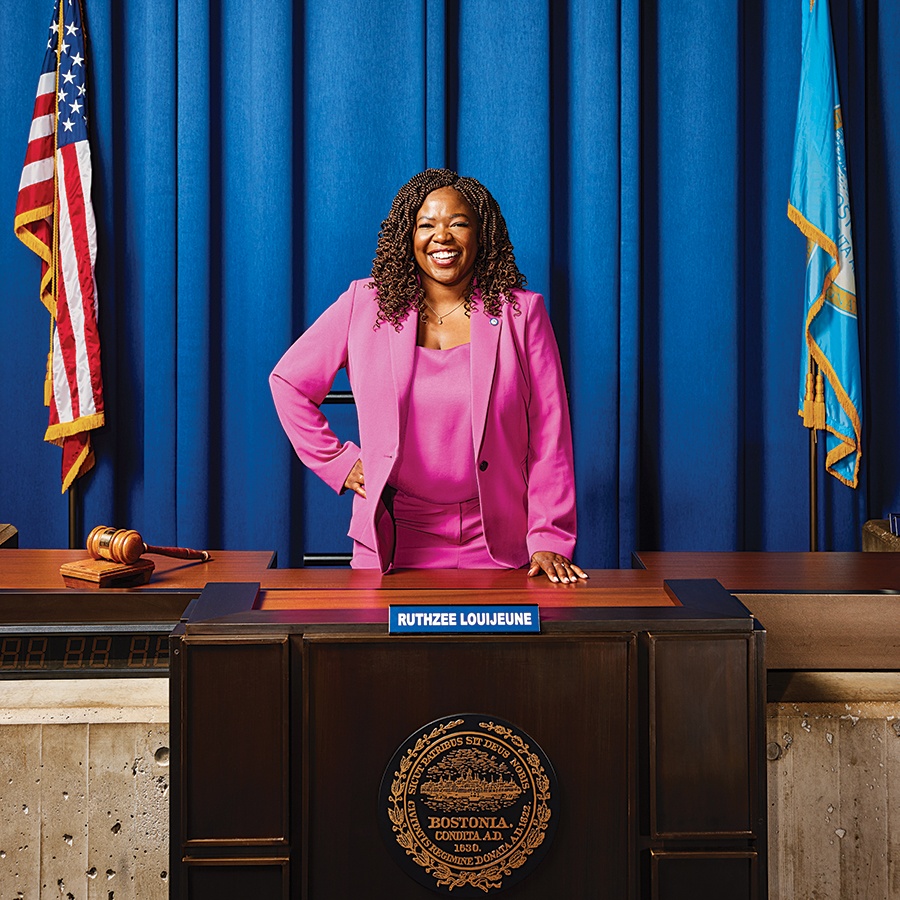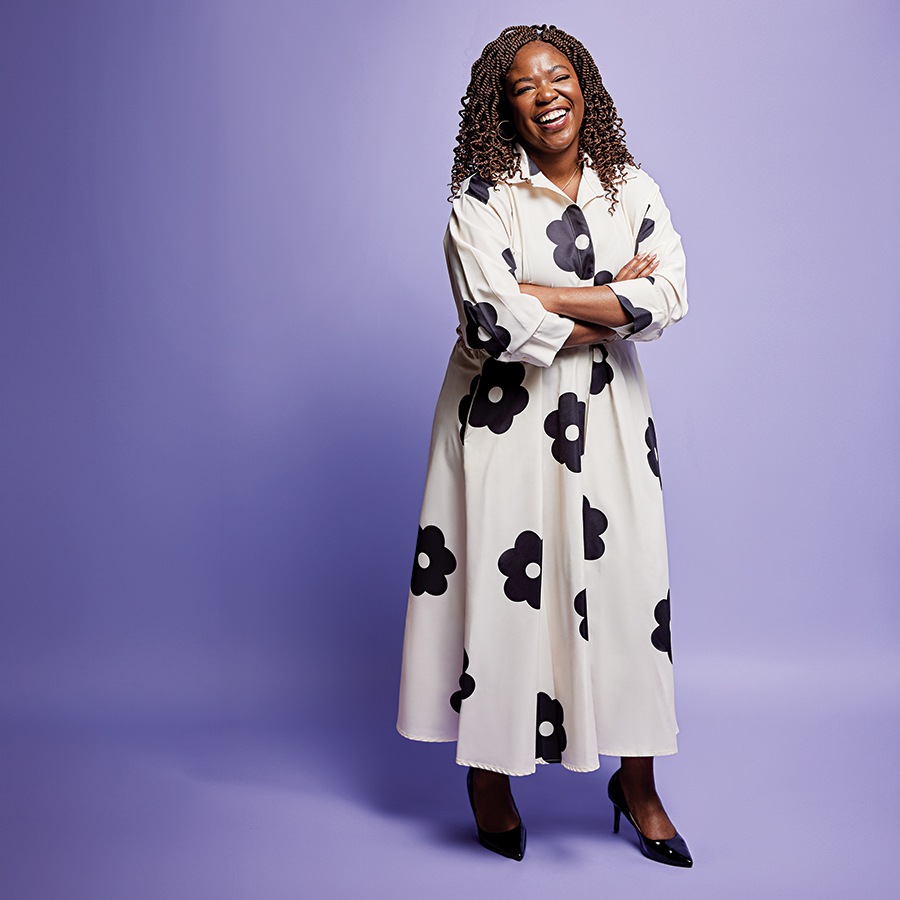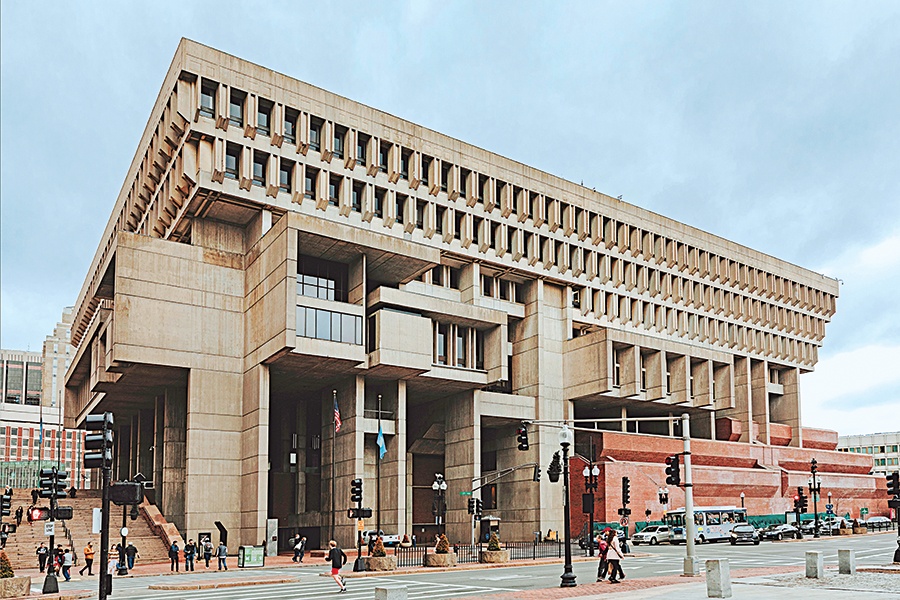This City Councilor Is Boston’s Brightest Rising Political Star
Ruthzee Louijeune talks the local housing crisis, the city's best Haitian food, and, for once and for all, how to pronounce her last name.

Portrait by Ken Richardson
What does the American dream look like today? If you ask Boston City Council President Ruthzee Louijeune, she might say it looks a little something like her life story. With roots in Mattapan and Hyde Park, and a work ethic inherited from her Haitian immigrant parents, Louijeune blazed through academia at Columbia and Harvard, practicing law before ascending to the city council. Now, as she’s undoubtedly become one of the region’s brightest rising political stars, we caught up with the councilor at large and No. 75 Most Influential Bostonian of 2024, for an exclusive tête-à-tête. On the agenda? The high-stakes mayoral race, Louijeune’s own political aspirations, and the gazillion-dollar question on everyone’s lips: Can Boston’s housing crisis ever be fixed?
First off, how often do people get your name right on the first try?
Never. [Laughs.] The first name is actually phonetic. It’s just that people aren’t used to seeing it. They’re used to seeing Ruth and they stop there, and I’m like, “No, keep going. There’s more.” It’s just hard because you don’t hear T, H, and Z together, so you don’t know what to do with that. With the last name, it’s like dealer’s choice. But I give people the tutorial: Louis, like your Louis Vuitton bag, and then Jen, like short for Jennifer.
What’s the best perk of your job?
Honestly, the best part of the job is interacting with young kids. It reminds me that our work is to make sure that we’re building a better Boston for them. Visiting schools, anything that has to do with teaching our young kids about government and how their voices matter, and hearing about the things they want us to be doing at City Hall.
So how do we nurture the next generation of city leaders?
For me, I grew up in Mattapan. My parents were not at all involved in government. They’re immigrants from Haiti. But I think it’s so incredibly important that we show kids that government is something people can touch and feel. This Wednesday, before the weekly council meeting, I’m hosting some high school students to get them to see that they, too, can be in a position of power and influence. You know, as the first Haitian-American on the Boston City Council, growing up, I could never have envisioned that.
What are your ambitions beyond City Council?
I just want to make sure that I’m using my talents and my time to do the work that’s needed. I’m taking it one job at a time right now. I’m president of the Boston City Council. I’m a lawyer by trade. I grew up in this city. I care deeply about issues of housing justice, racial justice, and social justice. How do we make sure that immigrants are a part of the process, that people in groups that have been marginalized and forgotten for so long by our system know that they have a voice in our government?
You’ve worked extensively on housing law. What do you think the solution is to Boston’s housing problem?
It really is twofold. I’m often on the phone, talking to developers and community activists about this. We need to be producing more housing. Interest rates are high, and labor costs are high, so right now, we’re in a difficult market. We need to be building both market-rate and affordable housing, and that means having more transit-oriented housing. This administration has been doing great work around additional dwelling units so that people who have extra land in their backyard or garage can turn that into livable space, what we often call naturally occurring affordable housing. We are reforming our zoning codes so that it doesn’t take so long to get projects off the ground. We have a lot in the pipeline.
There’s already been a lot of chatter about next year’s mayoral race. Any predictions?
I like the direction the city is going in. I like the bend toward progress and focusing on the issues that we’ve got to address, and I hope that continues.
What do you think is the most significant unmet need in the city right now?
It really is housing. Those are the questions that we get asked most as city councilors. I started my career at housing court, representing folks facing eviction and foreclosure, and it’s a crisis for both the adults and the children who face displacement. Your education takes a really big hit if you don’t have a stable place to call home. Also, the climate crisis is here, and we’re a coastal city, so we need to do a faster job of building the coastal resiliency that’s going to protect our neighborhoods. And then, we’re a city with a lot of prosperity from meds and eds, hospitals and universities, but we still have a persistent and pernicious racial wealth gap. So we need to continue thinking about the connective tissue between Mattapan and Harvard, between Mission Hill and Northeastern. How do we strengthen those ties?

Portrait by Ken Richardson
How would you grade Boston Public Schools right now?
Oh, that’s a tough question. It would be somewhere between like a B-minus and a C-plus right now.
That’s not exactly top of the class. How can the school system get a better grade?
I think we all know what the problems are. We need to make sure that we have the right number of school buildings for our kids. We’re spending too much money on buildings that should be closed. And then we need to make sure that we’re connecting students with the resources they need to thrive. So many of our kids walk in every day with various levels of trauma. Our students are facing the impact of the post-COVID mental health crisis. I’ve been advocating for more guidance counselors, social workers, and psychologists in our schools. Teachers shouldn’t be expected to do everything.
On another note, where can I find the best Haitian food in Boston?
You’ve got to find out where the Gourmet Kreyol food truck is. It’s run by Nathalie Lecorps, and it’s amazing. But there are also restaurants that have really, really good food. Little Haiti International Cuisine and Las Vegas Seafood Restaurant in Hyde Park are excellent, but there are so many; it’s really hard to choose just one.
Boston has one of the largest Haitian populations in the United States. What is the appeal of coming to the frozen north from the Caribbean?
I think you’d have to go back to the ’60s and ask them why they settled in this very cold place, but I think they came here for opportunity and jobs. Boston has schools and hospitals, and a lot of Haitians work in the medical field. We have a lot of doctors. My mom was at Cambridge Hospital for 34 years as a nursing assistant. And all it takes for an immigrant community to form is for one family to start settling there, and then more people start coming.
What’s your favorite tourist attraction in your neighborhood?
Well, I don’t know if it’s a tourist attraction, but I really enjoy the Southwest Corridor Park. Walking or running or biking it. There’s a lot of history to it, too. It was supposed to be a highway, but that was stopped by people-power, and there’s something really beautiful about that.
How about in Boston as a whole? If somebody comes from out of town and they’ve never been to Boston, where do you tell them to go?
That’s hard. My office has been doing work on the Black Heritage Trail downtown. It’s really cool. It tells the history of the African-American community on Beacon Hill. I love the Neponset Trail in Mattapan and Dorchester. It’s beautiful. But, you know, my first job, when I was 14, was as a walking-tour guide of Boston neighborhoods. So I would also recommend the jazz-culture district. We’re now rebirthing it, where Wally’s Café Jazz Club is. And, of course, Charlie’s Sandwich Shoppe, which was one of the only restaurants in Boston that served Black people, and performers like Sammy Davis Jr. would stop by. Then there’s Franklin Park and the zoo, and I used to literally live at Jamaica Pond. Those are my go-to spots.
Immigration is such a hot-button issue. What do you, as the child of immigrants, think is the solution?
I mean, I am a local elected official, so my jurisdiction is really potholes, schools, the lights are out, how do we build more affordable housing. But we really need to get better on a national level with our foreign policy in countries like Haiti, Mexico, and Venezuela so that we can make sure we’re helping to build conditions where people aren’t feeling forced to leave and aren’t being politically persecuted, aren’t being persecuted as a result of their gender identity. All of that happens if we have stronger and better diplomacy.
Do you think Boston deserves its reputation as a racist city?
It’s complicated. When you look at how far we’ve come in terms of who the city’s leaders and movers and shakers are, I think that would be an unfair statement. But I think we still have a fair way to go. We still have that pernicious racial wealth gap, and that did not just create itself. We should be actively working to make Boston a more welcoming city. I know that’s what this administration is doing, and Boston is a city with a majority of people of color. It’s just that we all live in silos, and people are too segregated, so it comes across as though there’s more strife than there actually is. So yes, we have issues here. But we’re working on it like crazy. We have a mayor who is of Chinese descent, and a City Council that’s extremely diverse. People say this is a new Boston, but I say this is just Boston coming into itself.
Do you have a personal motto?
Oh, yes. Closed mouths don’t get fed. Which means if there’s something that you want, you ask for it. The worst someone can say is no.
Who’s the person you admire most?
My father, for all the reasons people admire their fathers, but also because he’s good personified. He grew up in abject poverty, but he became very civically engaged in my education as head of the parent-teacher council. I get my drive and energy from him. He’s an extrovert. I’m just really lucky to have him as my blueprint. And like every father, he’s also very annoying. [Laughs.] We lived in Mattapan, and my father never locked the door because people who needed food or a place to stay could always stay with us.
When you were a student at Harvard, what was the most important lesson you learned?
Use the resources at your disposal. I am a Black girl who grew up in Mattapan and Hyde Park, with parents who did not go to college. They were smart, but my grandmother didn’t know how to read and write. So it’s really how I’m making use of the privilege of my education, the privilege of my social capital. I try to do that by connecting people who have great ideas but not the resources with people who have those resources, to strengthen our social fabric. It’s not a thing that Harvard taught me academically, but it’s what being in that environment taught me.
Is Elizabeth Warren still your mentor?
Definitely. I worked on her presidential campaign as her senior attorney back in 2020, and she is someone who I can turn to and ask, “How do I navigate this politically thorny or tricky situation?”
Person from history you’d most like to meet?
That’s a really good question. I think the heroism, courage, and defiance displayed by Harriet Tubman are pretty remarkable. In the 1800s, for a Black woman to have freed so many folks who were in bondage, is incredible.
How do you most want to be remembered?
That I brought everything I have in me to help solve some of our most intractable problems, and that I cared deeply about people.

Photo via Isaac Murray/Getty Images
By the Numbers
Politics as Usual?
In recent years, Boston City Council members have given us lots to talk about.
2019
Year Boston City Council passed a Green New Deal resolution outlining ambitious goals for carbon neutrality and climate resilience.
7
Number of members in 2020 who were people of color, making it the most diverse city council in Boston history.
10–2
Final vote on a new Boston redistricting map that passed last year after an acrimonious political process that included charges of racism and anti-Catholicism, as well as federal court involvement.
50 to 60
Percent rat sightings have dropped in J.P. since City Council President Ruthzee Louijeune and her staff rolled out a pilot rat-birth-control program in the neighborhood.
5,000
Amount, in dollars, Councilor Tania Fernandes Anderson agreed to pay for violating conflict-of-interest laws when hiring her son and sister, and then giving them raises.
A version of this story was first published in the print edition of the September 2024 issue with the headline, “Madame President.”

